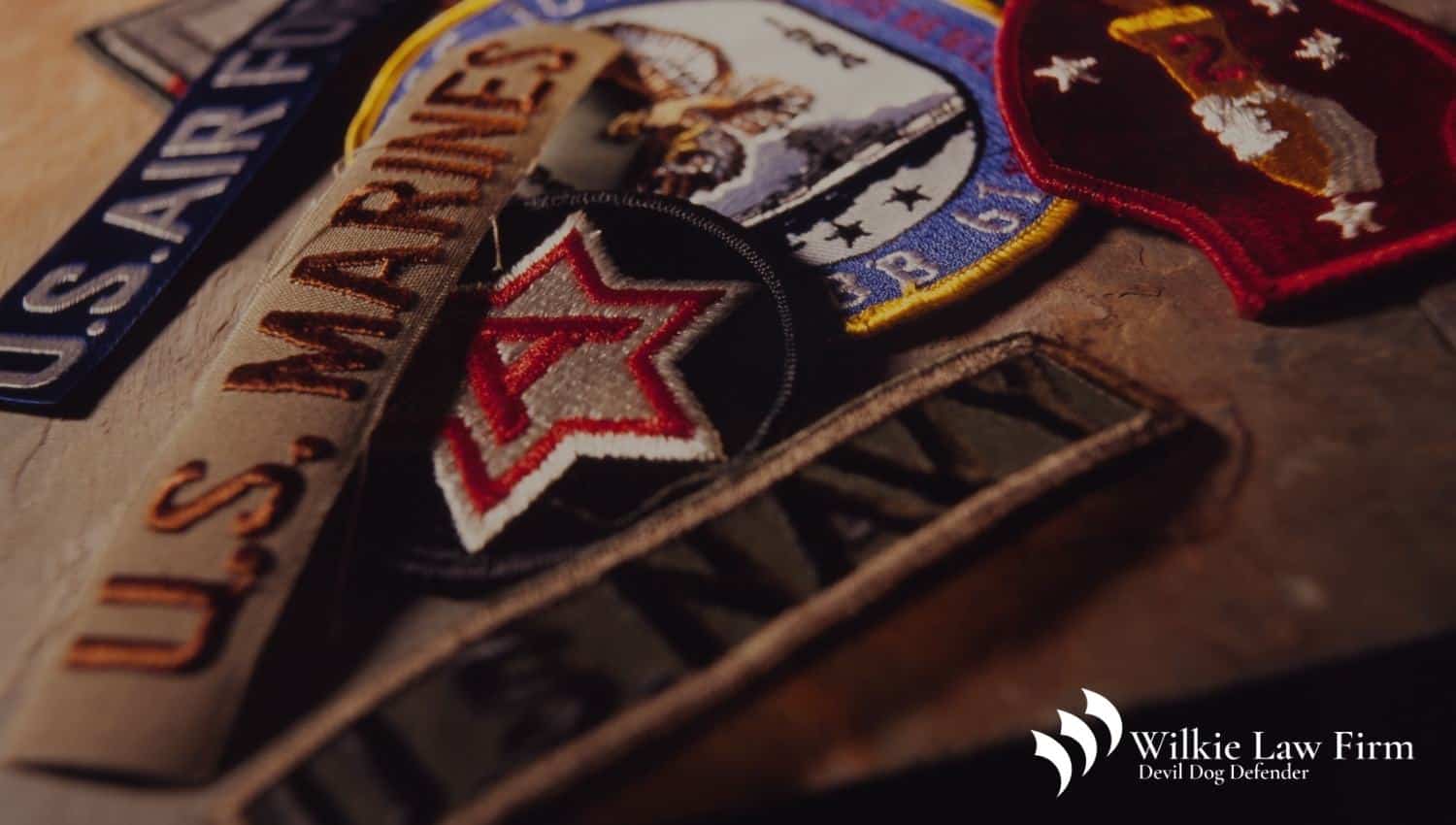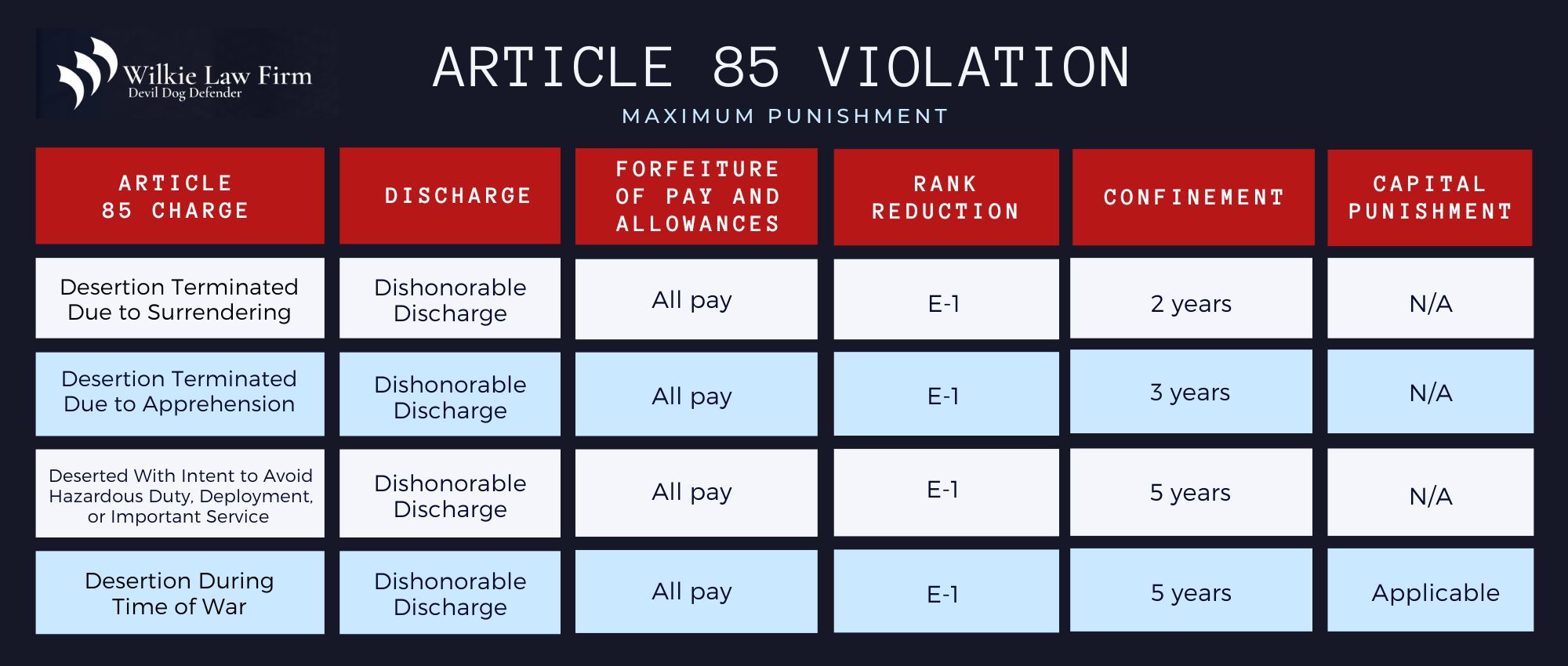Article 85 UCMJ
Military Defense Attorney for Article 85 Violations
Home » Article 85 UCMJ
Military Counsel
UCMJ Articles
Article 85 of the UCMJ – Desertion
Table of Contents
Members of the armed forces are subject to a completely different set of laws than civilian society. These laws are found in the articles of the Uniform Code of Military Justice, also referred to as the UCMJ Articles.
There are two general categories of offenses listed in the punitive articles section of the UCMJ: offenses that have a civilian counterpart – such as murder (Article 118) or rape (Article 120) – and the category known as “military specific,” which are offenses that are unique to the military. These military-centric offenses criminalize conduct that occurs in the civilian world but is not illegal, such as adultery, as well as offenses that there is no analog for in the civilian world.
Aden Wilkie, an experienced North Carolina military defense lawyer at the The Wilkie Law Group, will cover the ins and outs of an offense that is military specific – UCMJ Article 85, desertion.

What is UCMJ Article 85?
Article 85 of the Uniform Code of Military Justice covers the act of desertion. Desertion exists when any member of the armed forces:
- Without authority, goes or remains absent from his or her unit, organization, or place of duty, with intent to remain away therefrom permanently; or
- Quits his unit, organization, or place of duty with intent to avoid hazardous duty or to shirk important service; or
- Without being separated from one of the armed forces, enlists or accepts an appointment in the same or another of the armed forces without fully disclosing the fact that he has not been regularly separated; or
- Enters any foreign armed service except when authorized by the United States.
Additionally, a commissioned officer is guilty of desertion if, after tender of a resignation and before notice of its acceptance, he quits his post or proper duties without leave and with intent to remain away permanently.
Elements of UCMJ Art. 85 Violation
Intent to Remain Away Permanently
The specific elements of desertion with intent to remain away permanently are as follows:
- The accused absented himself from his unit, organization, or place of duty;
- That such absence was without authority;
- That the accused, at the time the absence, began or at some time during the absence, intended to remain away from his unit, organization, or place of duty permanently; and
- The accused remained absent until the date alleged.
- If the absence was terminated by apprehension, that element is added.
Intent to Avoid Hazardous Duty
The specific elements of desertion with intent to avoid hazardous duty include the following:
- The accused quit his or her unit, organization, or other place of duty;
- That the accused did so with the intent to avoid a certain duty or shirk a certain service;
- That the duty to be performed was hazardous or the service important;
- That the accused knew they would be required for such duty or service; and,
- That the accused remained absent until the date alleged.
Desertion vs. AWOL
Again, this is a military-specific crime, just like the similar crime of Absence Without Leave (AWOL) found in UCMJ Article 86. Different services have different names for this crime. Some call it AWOL, while others call it UA (Unauthorized Absence).
While the crime of desertion may seem like a close cousin of AWOL, desertion is more serious and includes a specific intent element that is not present in UCMJ Article 86. Put simply, it is the difference between being late or gone for a little while versus leaving or staying away with no intent to ever return.
While AWOL is a general intent crime, desertion is a specific intent crime, which requires a specific mental state of mind or “mens rea.” So, if the Government cannot prove that the accused’s absence had specific intent to remain away, then this charge fails. That being said, such intent can be proven by circumstantial evidence such as actions, behavior, or specific statements of the accused.

What is the Punishment for Violating Article 85?
A person found guilty of desertion in the military faces serious penalties. The punishment for a violation of UCMJ Article 85 is typically Dishonorable Discharge, total forfeitures of all pay and allowances, reduction to E-1, and anywhere between two-five years confinement. If the service member surrenders, the maximum punishment is two years confinement. If the desertion terminated due to apprehension rather than surrendering, the time is bumped up to three years. If a service member deserted with the intent to avoid hazardous duty, deployment, or important service, it increases to five years of confinement. Finally, if the accused deserts in time of war, the sentence can include death and such other punishment as the court-martial may direct.
What Must Be Proven for a Conviction
As part of their duties, Military Judges presiding over a court-martial are responsible for instructing the trier of fact (e.g., members, which is the military term for jury) as to how they may weigh the evidence and what specific elements the Government must prove beyond a reasonable doubt to achieve a guilty verdict for a particular crime. Additionally, the Judge will define certain terms for the members that are relevant to the crime charged.
For example, in the case of desertion, the evidence must support that the accused intended to remain away permanently. The Judge will instruct the members that the intent may be formed at any time during the absence and does not need to be held for the entire period of the absence, just during some point of the absence.
Some things the members of the jury must also consider when determining the accused’s intent to permanently remain away include the circumstances surrounding the beginning, length, and termination of the charged absence.
Apprehension is an Aggravating Factor
As briefly mentioned before, apprehension occurs when the accused’s return to military control was involuntary. That is, neither the accused nor anyone acting on the accused behalf facilitated the accused’s return.
The mere fact your arrested does not equal apprehension for purposes of this crime unless the basis or one of the bases for the arrest was done on behalf of the military authorities. Thus, if your arrested for speeding and they do not figure out you’re a deserter you can tell the cops yourself that is the case and make sure such sis documented. That way you have surrendered yourself not apprehended. This is significant because as noted above apprehension is what is known as an aggravating factor which can result in a greater amount of time in confinement as part of your sentence.
What About Attempted Desertion?
Even if the accused’s departure never actually occurred, if the prosecution can show that there was an attempt to desert, a UCMJ Article violation may still be warranted. Under UCMJ Art. 80 (Attempts), an attempt to desert occurs when:
- The accused engaged in a certain overt act; and
- The act was done with the specific intent to desert;
- The act amounted to more than mere preparation; and
- The act apparently tended to affect the commission of the offense of desertion
Military Defense Attorney for Article 85 Violation
Service members stand to lose a lot when they face a charge for violation for desertion or even attempted desertion. It’s incredibly important that they have someone in their corner fighting aggressively for their freedom and their future. That person is North Carolina criminal defense attorney Aden Wilkie of The Wilkie Law Group. When you obtain the help of the Devil Dog Defender, he will get straight to work creating a strong defense strategy and protecting your legal rights. Located in Jacksonville, NC, Aden Wilkie services armed forces at Camp Lejeune and Fort Bragg as well as other bases, camps, stations, and posts across the nation.
Please keep in mind that this article is for general information purposes. Once an attorney-client relationship is established, you will be able to learn more about your legal options regarding your unique case. Call 910-333-9626 today for a consultation or complete our online intake form to learn more.
Contact an Article 85 Counseling Attorney
It is vital to use the knowledge of a seasoned attorney to organize and prioritize the material to present to the command. Call The Wilkie Law Group at 910-333-9626 to arrange your consultation.





